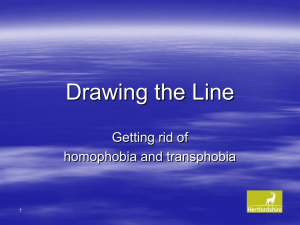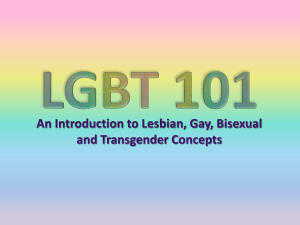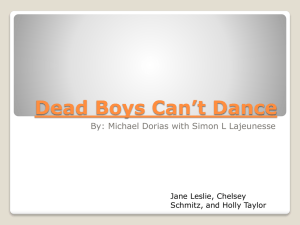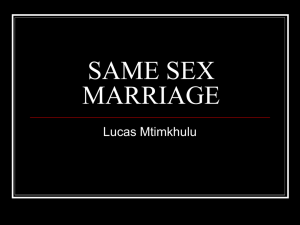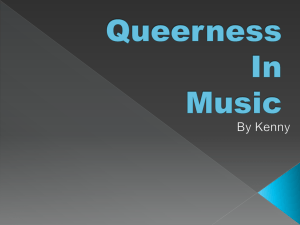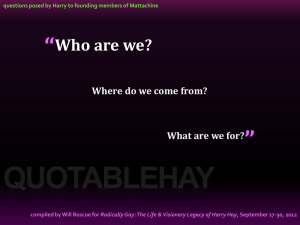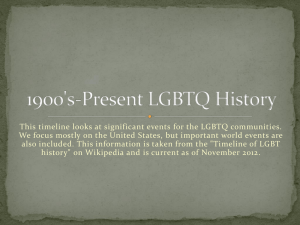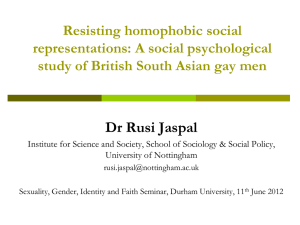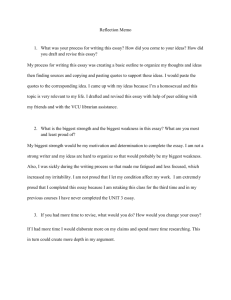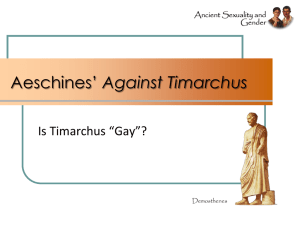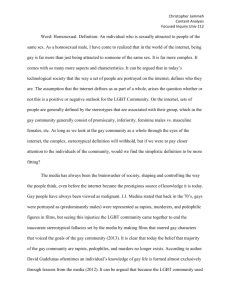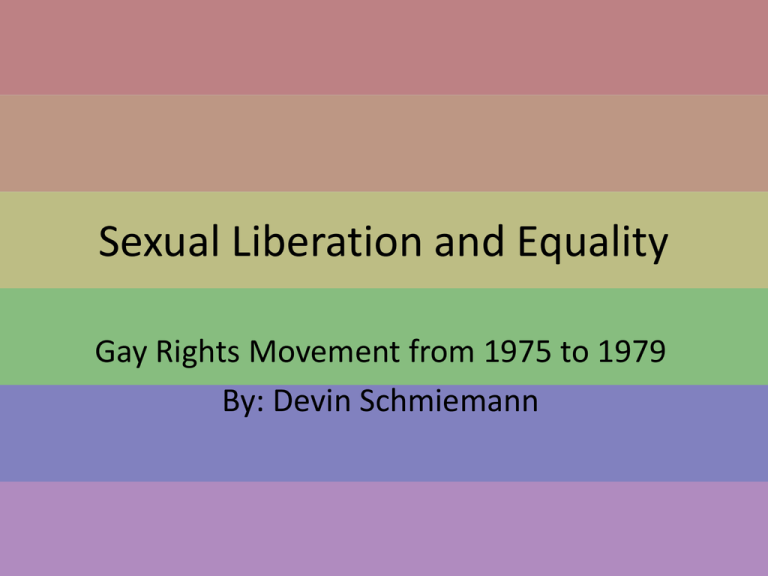
Sexual Liberation and Equality
Gay Rights Movement from 1975 to 1979
By: Devin Schmiemann
Sexual Liberation and Equality
Gay Rights
Homosexuals have always been known in America as social outcasts, sexual
deviants, and even perverts. It has been a daily struggle for homosexuals to
try to gain acceptance by society for something they feel they were born with.
“Gender issues accompanied a demand for equality on the part of those of
untraditional sexual orientation– bisexuals, homosexuals (gays and lesbians),
and other transgendered individuals.”(Fiero)
•
Gender: “culturally prescribed construct of masculine or feminine identity”
(Fiero)
•
Sex: “a biologically determined construct, distinguishes the individual as either
male or female” (Fiero)
•
Equality: “likeness or sameness in quality, power, status, or degree.”
(“equality”)
1975
September 8, Time Magazine
publishes “Homosexuality: Gays on
the March” which raises the issue
of public
acceptance(“Homosexuality: Gays
on the March”)
Photo: (TIME Magazine Cover: I
am a homosexual)
California and Washington remove private
consensual homosexual acts as criminal
behavior(“SOIN-Gay Events Timeline”)
1975
1975
“The Rocky Horror Picture
Show” is released which mocks
society’s view of homosexuals
being less than human; raises
attention to transgender issues
[“The Rocky Horror Picture Show
(1975)”].
Photo: (Rocky Horror Picture
Show- poster)
1975
Study suggests that homosexual men have brains that act more like a
female brain, giving homosexuality a possible genetic basis (Dorner, et
al).
Photo: (Brain Scans Comparing Homosexuals and Heterosexuals)
Iowa repeals sodomy law which allowed for the arrest of any persons
accused of committing sodomy, even if the act was consensual. “Despite
the repeal, the Iowa Supreme Court ruled that same-sex sodomy did not
enjoy constitutional protection, but that opposite-sex sodomy did”
Therefore, homosexual men were still convicted of sodomy and
imprisoned.(Painter).
1976
1977
The pink triangle, which was originally used to
signify homosexuals in Nazi concentration camps,
is inverted and adopted by the gay rights
movement as a symbol to fight oppression, work
for acceptance, and as a vow to never let a
holocaust happen again (“Gay, Lesbian, Bisexual &
Transgender Symbols”).
Photo: (Holocaust Prisoners…)
1977
Hal Fischer explains gay fashion and how certain accessories are used as
subtle signifiers to identify each other in order to remain invisible to an
intolerant society (Fischer).
Photo: (Fischer)
Red = life
Orange = healing
Yellow = sun
Green = nature
Blue = art
Violet = spirit
1978
Gilbert Baker creates the first gay pride flag which
was then flown in the San Francisco Gay and
Lesbian Pride Parade. Each color signifies a
different aspect of gay and lesbian life(“Gay,
Lesbian…”).
Image from Microsoft Clip Art
1979
First Gay rights march on Washington; over 100,000 people
attended(Beemyn).
Photo: (Doyle)
1979
“We are Family” by Sister Sledge is released and becomes the anthem of gay
activists marching on Washington D.C (Rein).
(Click on bell to hear song)
Photo: (Sister Sledge-Album cover)
Conclusion
The years 1975 through 1979 were a difficult time
for gays and lesbians in American society.
Homosexuality was still treated as an illness or a
“sexual perversion.” This was a time that the
LGBT community decided it was time to stand up
for their rights and they made a big impression by
marching on Washington. The research that went
into this presentation taught me a lot about how
people fought for the rights that I enjoy today.
They did not make any great advancements for
gay rights in this time period, but they got the
ball rolling.
Works Cited
Beemyn, Brett G. "Glbtq Social Sciences Marches on Washington." Glbtq: the World's Largest Encyclopedia of
Gay, Lesbian, Bisexual, Transgender, and Queer Culture. GLBTQ, Inc., 2004. Web. 15 July 2011.
<http://www.glbtq.com/social-sciences/marches_washington.html>.
Brain Scans Comparing Homosexuals and Heterosexuals. Digital image. New Scientist. New Scientist. Web. 16
July 2011. <http://www.newscientist.com/data/images/ns/cms/dn14145/dn14145-1_513.jpg>.
Dorner, Gunter, Wolfgang Rohde, Fritz Stahl, Lothar Krell, and Wolf-Gunther Masius. "A Neuroendocrine
Predisposition for Homosexuality in Men." Archives of Sexual Behavior 4.1 (1975): 1-8. Print.
Doyle, J.D. National March on Washington, 1979. Digital image. Queer Music Heritage. The National March on
Washington For Lesbian & Gay Rights, October 14, 1979. Web. 16 July 2011. <
http://www.queermusicheritage.us/march79.html>.
Works Cited (cont’d)
"equality." Merriam-Webster's Dictionary of Law. Merriam-Webster, Inc. 16 Jul. 2011. <Dictionary.com
http://dictionary.reference.com/browse/equality>.
Fiero, Gloria K. "Chapter 36: Liberation and Equality." The Humanistic Tradition Book 6 Modernism,
Postmodernism, and the Global Perpsective. New York: McGraw-Hill College, 2010. 97-125. Print.
Fischer, Hal. "Hal Fischer's Gay Semiotics 1977." Queer Cultural Center. Queer Cultural Center, Nov. 1977. Web.
15 July 2011. <http://www.queerculturalcenter.org/Pages/HalPages/GaySempg6.html>.
"Gay, Lesbian, Bisexual, & Transgender Symbols." LAMBDA Gay / Lesbian / Bisexual / Transgender Community
Services: Violence Gay Sex Sexuality Sexual Orientation Hate Crimes Youth Gay Bashing Teen Coming out
Anti-gay Homophobia Matthew Shepard Gay Hate Violence Texas New Mexico Gay Sex Gay Man Chat Gay
Woman El Paso Las Cruces Juarez Gay. LAMBDA, 26 Dec. 2004. Web. 17 July 2011.
<http://www.lambda.org/symbols.htm>.
Works Cited (cont’d)
Holocaust Prisoners wearing pink triangle marking them as homosexual. Digital image. The Pink Triangle, Love
at All Angles. Web. 17 July 2011. <http://rebeccaforce.files.wordpress.com/2010/03/pink_triangle-2.jpg>.
"HOMOSEXUALITY: Gays on the March - TIME." Editorial. Time Magazine 8 Sept. 1975. Breaking News, Analysis,
Politics, Blogs, News Photos, Video, Tech Reviews - TIME.com. TIME Magazine U.S. Web. 15 July 2011.
<http://www.time.com/time/magazine/article/0,9171,917784-10,00.html>.
Painter, George. "The History of Sodomy Laws in the United States - Iowa." Gay & Lesbian Archives of the Pacific
Northwest. Web. 16 July 2011. <http://www.glapn.org/sodomylaws/sensibilities/iowa.htm>.
Rein, Richard K. "When the Pirates Hustled to Sister Sledge's 'We Are Family,' the Steel City Went Platinum :
People.com." People.com : The #1 Celebrity Site for Breaking News, Celebrity Pictures and Star Style.
People, 05 Nov. 1979. Web. 15 July 2011.
<http://www.people.com/people/archive/article/0,,20074980,00.html>.
Works Cited (cont’d)
Rocky Horror Picture Show- poster. Digital image. Houston Press. Houston Press, 29 Sept. 2010. Web. 16 July
2011. <http://blogs.houstonpress.com/rocks/ST3391~Rocky-Horror-Picture-Show-Posters.jpg>.
Sister Sledge-Album cover. Digital image. Yahoo Music. Yahoo. Web. 17 July 2011.
<http://new.it.music.yahoo.com/sister-sledge/albums/we-are-family-collectables--159713822>.
"SOIN - Gay Events Timeline." University of Southern California. Ed. Vicki Torres. University of Southern
California. Web. 16 July 2011.
<http://www.usc.edu/schools/annenberg/asc/projects/soin/enhancingCurricula/timeline.html#1975>.
"The Rocky Horror Picture Show (1975) - IMDb." The Internet Movie Database (IMDb). The Internet Movie
Database (IMDb). Web. 16 July 2011. <http://www.imdb.com/title/tt0073629/>.
TIME Magazine Cover: I Am a Homosexual' - Sep. 8, 1975 - Homosexuality - Social Issues - Military. Digital
image. Breaking News, Analysis, Politics, Blogs, News Photos, Video, Tech Reviews - TIME.com. Time
Magazine, 8 Sept. 1975. Web. 16 July 2011.
<http://www.time.com/time/covers/0,16641,19750908,00.html>.


